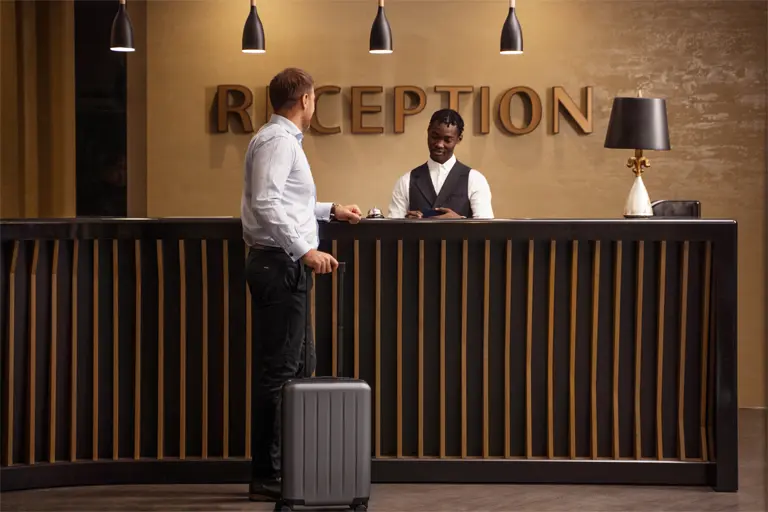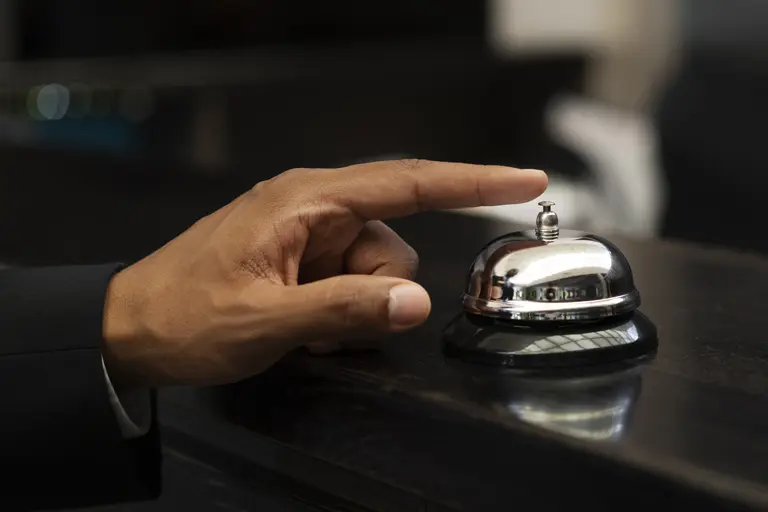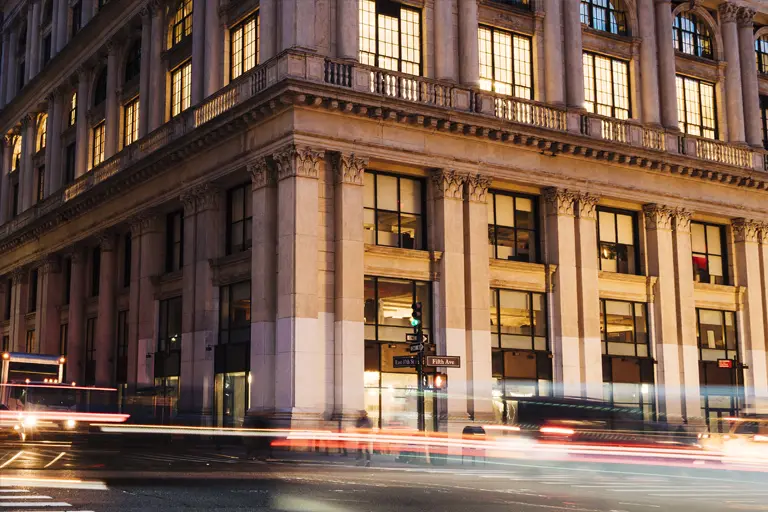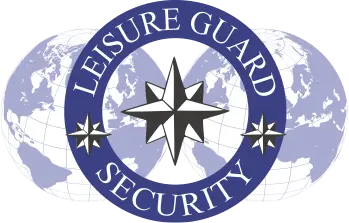London is one of the world’s busiest cities for tourism and business travel. Every year, millions of visitors check into hotels across the capital, from luxury 5-star establishments in Mayfair and Kensington to boutique hotels in Shoreditch and budget chains near airports. With such high turnover, hotels face a unique set of risks: theft, unauthorised access, fire, cybercrime, and anti-social behaviour.
This makes hotel security in London a critical part of guest experience and brand reputation. Guests choose hotels not just for comfort, but for the reassurance that their safety and belongings are protected. For hotel directors and managers, investing in professional hotel security is about more than compliance, it’s about protecting revenue, reputation, and the people who bring their business to life.
Why Hotels in London Face Unique Security Challenges
London is unlike any other UK city when it comes to hotel security. The sheer scale of the hospitality sector creates pressures and vulnerabilities that can’t be ignored.
Key challenges include:
- High guest turnover – Thousands of new check-ins every week mean constant risk of theft or unauthorised access.
- Open access spaces – Lobbies, bars, restaurants, and conference rooms allow members of the public to walk in freely.
- High-value assets – Guests bring laptops, jewellery, and vehicles that are prime targets for organised criminals.
- 24/7 operations – Night shifts and lone working expose staff to greater risks.
- International clientele – Hotels must meet the expectations of guests from around the world, where safety standards vary.
Hotel Security Challenges in London vs Guest Impact
| Challenge | Impact on Guests | Security Consideration |
|---|---|---|
| Open access areas | Risk of theft, intruders in lobby | CCTV, visible security presence |
| High guest turnover | Increased identity fraud risk | Rigorous ID checks, staff vigilance |
| High-value belongings | Loss or theft of property | Secure storage, monitored car parks |
| 24/7 operations | Staff fatigue, lone working risks | Trained night security guards |
| International clientele | Expectation of safety | Professional, discreet security officers |
Hotels in London cannot afford to treat security as an afterthought. A single incident can result in negative reviews, compensation claims, and long-term brand damage. By contrast, a robust hotel security service in London enhances guest trust and builds loyalty.
The 6 Silent Threats Hotels Face in London
Even the most prestigious hotels in London are not immune to security risks. While many incidents go unnoticed by guests, they can quickly escalate into events that damage reputation and revenue. These “silent threats” exist in every hotel, whether it’s a luxury 5-star or a budget chain near Heathrow.
- Theft
Hotels are prime targets for opportunistic thieves and organised groups. Lobbies, luggage areas, and car parks are all vulnerable.
- Guests expect belongings to be safe at all times.
- Thieves often blend in, making them hard to spot.
- Internal theft (by staff or contractors) must also be considered.
Common Theft Risks in London Hotels
| Target | Risk Level | Prevention Measure |
|---|---|---|
| Luggage in lobbies | High | CCTV + uniformed security patrols |
| Laptops & devices | High | Keycard-only guest floor access |
| Vehicles in car parks | Medium | Patrols + monitored entry barriers |
2. Fire Risks
With kitchens, laundry facilities, smoking areas, and thousands of electrical devices in use, the risk of fire is constant.
- Guests may not know evacuation routes.
- Delays in response can cost lives.
- Staff must be trained as fire wardens.
Quick Facts:
- Fire & Rescue Services attend over 1,600 hotel and guest house fires each year in the UK.
- The cost of even a small fire can exceed £10,000 in damages.
3. Unauthorised Access
Hotels welcome the public into lobbies, bars, and restaurants. But not everyone belongs beyond reception.
- Tailgating into lifts is a major risk in London hotels.
- Staff-only areas must be tightly controlled.
- Delivery entrances are often exploited.
Access Risks vs Controls
| Area | Threat | Control Measure |
|---|---|---|
| Guest floors | Intruders & theft | Keycard-only lift access |
| Back of house | Asset theft | ID badge system + staff checks |
| Deliveries | Smuggling, intruders | CCTV monitoring + logs |
4. Anti-Social Behaviour
London’s nightlife and business travel can bring with it rowdy guests, drunken disputes, and heated confrontations.
- One disruptive guest can disturb dozens of others.
- Complaints can lead to refunds or lost bookings.
- Skilled de-escalation avoids escalation to police.
5. Cyber & Tech Risks
Modern hotels are as digital as they are physical. From free Wi-Fi to card payments, vulnerabilities are everywhere.
- Hackers target hotel Wi-Fi networks.
- Payment card fraud can lead to heavy fines.
- CCTV systems can be hacked if not encrypted.
Cyber Threats for London Hotels
| Threat | Impact on Hotel | Mitigation Strategy |
|---|---|---|
| Wi-Fi hacking | Guest data theft | Secure encryption & monitoring |
| Card skimming | Fraud & chargebacks | Staff training + inspections |
| CCTV hacking | Privacy breaches | Encrypted systems & audits |
6. Staff Safety
Security isn’t just for guests; hotel staff face risks every day.
- Reception staff handle confrontations.
- Housekeepers may face harassment when working alone.
- Night staff are especially vulnerable as lone workers.
Quick Stats:
- In a 2023 UK hospitality survey, 52% of hotel workers reported feeling unsafe at some point during night shifts.
- Panic alarms and lone worker systems are now considered best practice in London hotels.
Takeaway:
These six threats rarely make headlines until something goes wrong. But for hotels in London, ignoring them can lead to costly claims, bad press, and long-term brand damage. Prevention isn’t optional, it’s essential.
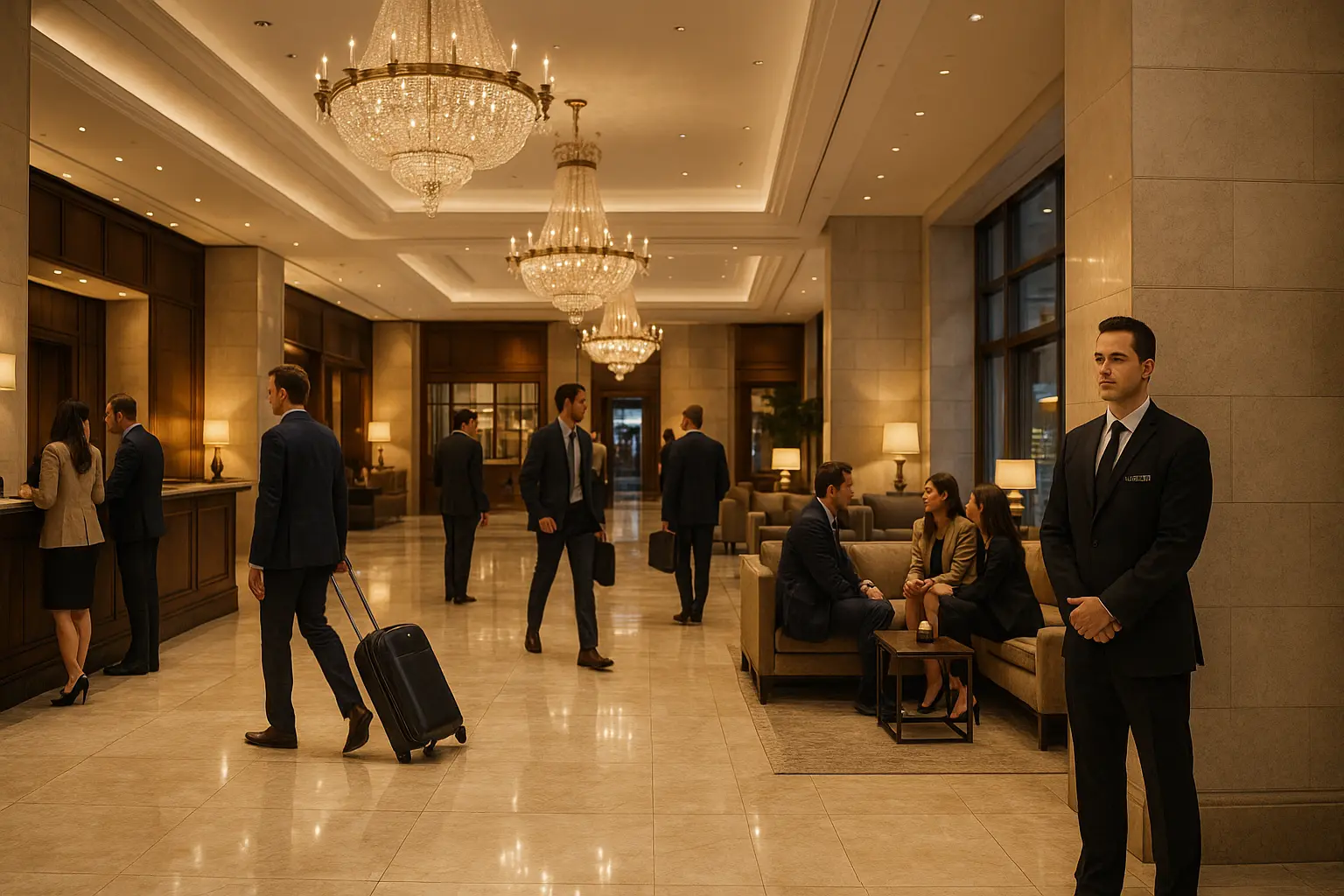
The Hotel Security Ladder: 5 Layers of Protection in London
Effective hotel security isn’t about a single measure; it’s about building multiple layers of defence. Think of it as a ladder: each rung supports the next. If even one layer is weak, the whole system is compromised.
For hotels in London, where guest expectations are high and criminal risks are constant, climbing the ladder of protection is essential.
Layer 1: Perimeter Security
The first line of defence starts outside the building.
- Well-lit entrances deter opportunists.
- CCTV towers and fixed cameras provide visibility.
- Patrols show a visible, reassuring presence.
- Barriers and bollards prevent vehicle-related crime.
Perimeter Security in London Hotels
| Perimeter Risk | Impact | Security Response |
|---|---|---|
| Vehicle crime | Guest property loss | Barriers, monitored car parks |
| Loitering | Guest unease, reputation damage | Patrol intervention |
| Vandalism | Repair costs, bad PR | Rapid detection + CCTV evidence |
Layer 2: Access Control
Not everyone should be able to go everywhere.
- Keycard-only access for lifts and guest floors.
- Staff ID systems for back-of-house.
- Visitor logs for contractors and deliveries.
- Security guards at entrances during peak hours.
Benefits of Access Control:
- Keeps intruders out of guest areas.
- Protects valuable stock and equipment.
- Reduces risk of identity fraud or unauthorised entry.
Layer 3: Guest Safety
Guest comfort means little without guest safety.
- Fire marshals ensure orderly evacuations.
- Security staff trained in first aid provide immediate help.
- Safeguarding protocols protect vulnerable guests.
- Discreet monitoring prevents panic but ensures safety.
Guest Safety Threats vs Security Role
| Threat | Impact on Guests | Security Role |
|---|---|---|
| Fire incident | Panic, injury, loss of life | Fire marshal duties |
| Medical issue | Health crisis | First aid trained officers |
| Harassment | Trauma, legal claims | Immediate intervention |
Hotels must protect both guest belongings and hotel property.
- Secure luggage storage reduces theft risk.
- Monitored car parks deter vehicle crime.
- IT systems and card payments need cyber defences.
- CCTV protects high-value areas like conference rooms.
Assets at Risk:
- Guest luggage, laptops, and jewellery.
- Vehicles in car parks.
- Hotel equipment, stock, and IT infrastructure.
Layer 5: Reputation Protection
The final, and often most valuable, layer is reputation. One security incident can undo years of hard work in brand-building.
- Guests expect safety, it’s part of service.
- Online reviews spread instantly.
- Prevention is cheaper than crisis management.
| Incident Type | Immediate Cost | Long-Term Damage |
|---|---|---|
| Theft | Compensation/refunds | Bad reviews, loss of trust |
| Fire evacuation | Insurance claim | PR damage, cancellations |
| Disorderly guests | Refunds, guest disruption | Negative publicity online |
Takeaway:
Hotels that climb all five layers protect more than property, they safeguard experiences, staff wellbeing, and brand reputation. In London’s competitive hospitality market, layered security is the difference between risk and resilience.
Security Technologies for Hotels in London
Technology is now central to modern hotel security. In a city like London, where hotels must balance guest comfort with strong protection, the right mix of tech can make all the difference. When combined with professional security officers, technology provides visibility, control, and rapid response.
1 CCTV and AI-Powered Monitoring
- High-definition CCTV cameras cover entrances, lobbies, corridors, and car parks.
- AI analytics detect suspicious behaviour automatically (loitering, tailgating, crowding).
- Remote monitoring ensures incidents are spotted instantly.
2 Access Control Systems
- Keycard access for lifts and guest rooms reduces unauthorised entry.
- Biometric systems are increasingly used in high-end hotels for staff-only areas.
- Visitor management systems log contractors and deliveries.
3 Lone Worker and Panic Alarm Systems
- Housekeepers, night porters, and reception staff can carry panic alarms.
- Lone worker technology sends alerts if staff are at risk or unresponsive.
- Ensures rapid response, especially during night shifts.
4 Cybersecurity for Hotel Networks
- Hotels are frequent targets for hackers due to guest Wi-Fi and card payments.
- Secure encryption prevents data theft on public networks.
- Regular vulnerability testing reduces risks of GDPR breaches.
5 Integrated Security Platforms
- Modern systems connect CCTV, access control, and alarms into one hub.
- Integrated dashboards allow managers to monitor incidents in real time.
- Data insights highlight patterns of risk and help allocate resources efficiently.
Security Technology Benefits for London Hotels
| Technology | Key Benefit | Example Application |
|---|---|---|
| CCTV + AI Analytics | Detects threats instantly | Identifying loitering in lobbies |
| Keycard/biometric access | Prevents intruder access | Guest floors, staff-only zones |
| Panic/lone worker alarms | Protects staff | Housekeepers, night reception |
| Cybersecurity systems | Protects guest data | Wi-Fi & payment networks |
| Integrated platforms | Centralised control | Real-time incident monitoring |
Takeaway:
For hotels in London, security technology is no longer optional, it’s expected. Guests assume Wi-Fi is safe, their rooms are secure, and staff are protected. The most effective approach is combining technology with trained security officers, creating a seamless shield around the hotel.
London’s Leading Hotel Security Services
Your Hotel Deserves More Than Basic Security
We combine visible deterrence, advanced technology, and highly trained security officers to protect what matters most — your people, your property, and your brand. Speak to our team today about building a tailored hotel security solution for your business.
The Role of Professional Hotel Security Officers in London
While technology is essential, it cannot replace the value of trained, licensed hotel security officers in London. Guests feel reassured by a professional presence, and staff know they have backup in difficult situations. Security officers are not just guards; they are guest-facing professionals who combine protection with service.
1 Licensed and Qualified
- In the UK, officers must hold an SIA (Security Industry Authority) licence.
- Many also complete specialist training in CCTV, conflict management, and door supervision.
- Hotels in London often require officers with additional hospitality training to ensure guest interactions are positive.
2 Fire Marshal and First Aid Trained
- Security staff are frequently designated as fire marshals in hotels.
- They supervise orderly evacuations and assist emergency services.
- First aid certification means they can respond instantly to medical issues before paramedics arrive.
3 Conflict Resolution and De-escalation
- Rowdy guests or anti-social behaviour can disrupt dozens of paying customers.
- Trained officers use calm, professional techniques to de-escalate without embarrassment or escalation.
- When police are needed, officers manage the handover smoothly.
4 Discreet but Visible Presence
- Effective hotel security is reassuring but not intimidating.
- Officers blend into the guest environment while maintaining authority.
- This balance is especially important in luxury London hotels, where guest experience is paramount.
5 Support for Hotel Staff
- Reception staff are often the first point of conflict; security provides backup.
- Housekeepers working alone in rooms benefit from officer patrols and panic alarm response.
- Night managers and lone workers rely on security for safety.
Training & Skills of London Hotel Security Officers
| Training Area | Value to Hotel |
|---|---|
| SIA Licensing | Legal compliance & professionalism |
| Fire Safety | Life-saving evacuation procedures |
| First Aid | Immediate response to emergencies |
| Conflict Resolution | Prevents escalation of disputes |
| Hospitality Training | Positive guest interactions |
Takeaway:
Professional hotel security officers in London are multi-skilled, combining legal compliance, emergency training, and customer service. They protect not just property, but also the people and reputation that make a hotel successful.
The Business Case for Hotel Security in London
For hotel directors and managers, security is sometimes seen as a line-item expense. But in reality, hotel security in London is one of the strongest investments you can make. The financial, reputational, and operational benefits far outweigh the costs of prevention.
1 Cost of Incidents vs Cost of Prevention
Even a single security breach can cost more than an annual security contract.
- Theft claims often require hotels to compensate guests.
- Insurance excess and premium increases add long-term costs.
- Negative online reviews reduce future bookings.
| Incident Type | Average Financial Loss | Hidden Costs |
|---|---|---|
| Guest theft (laptop, jewellery) | £2,000 – £5,000 | Refunds, bad reviews, loyalty lost |
| Fire evacuation | £10,000+ | PR fallout, cancelled bookings |
| Rowdy guest disruption | £500 – £2,000 per incident | Refunds, review damage |
| Cyber breach | £15,000+ (fines, legal fees) | GDPR penalties, long-term trust loss |
2 Insurance Benefits
- Many insurers require hotels to have security measures in place.
- Professional officers, CCTV, and access control can reduce premiums.
- Failure to maintain adequate security can lead to rejected claims.
3 Guest Reviews Drive Revenue
In London’s competitive hotel market, reviews are everything.
- A single 1-star review about theft or safety issues can deter dozens of potential bookings.
- Guests often mention “feeling safe” in positive reviews, making it a selling point.
- Security failures are amplified by platforms like TripAdvisor, Booking.com, and Google Reviews.
4 Protecting Staff Retention and Morale
- Staff are more likely to stay with employers who prioritise their safety.
- Reduced staff turnover saves recruitment and training costs.
- Confident staff deliver better guest service.
5 Long-Term Brand Value
- Luxury hotels in London cannot afford reputational risks.
- Security becomes part of the brand promise, a discreet but powerful differentiator.
- Over time, prevention protects brand value far more than recovery ever could.
Takeaway:
Investing in professional hotel security in London is not just about preventing incidents, it’s about protecting revenue, reducing costs, and safeguarding reputation. In financial terms, prevention is always cheaper than repair.
Professional Hotel Security in London, Tailored to You
Protect Your Guests, Safeguard Your Reputation
From luxury hotels to budget chains, our licensed security officers provide discreet, 24/7 protection across London. Trained in fire safety, first aid, and conflict resolution, they safeguard guests, staff, and assets without compromising the guest experience.
Building a Security Culture in London Hotels
Technology and professional officers are vital, but they are most effective when supported by a strong security culture throughout the hotel. In London, where hotels face constant guest turnover, international visitors, and urban crime risks, embedding security into everyday operations is essential.
1 Training All Staff in Security Awareness
- Every staff member, from housekeeping to concierge, should be trained to spot risks.
- Reception teams must know how to verify IDs and handle suspicious behaviour.
- Housekeeping staff can act as early warning for fire hazards or guest misconduct.
2 Embedding Procedures into Daily Operations
- Clear protocols for reporting suspicious activity.
- Regular checks of emergency exits, alarms, and equipment.
- Integration of security awareness into staff briefings and shift handovers.
3 Regular Drills and Audits
- Fire and evacuation drills at least twice a year.
- Cybersecurity audits to check Wi-Fi and payment systems.
- Mock “test intrusions” to ensure staff recognise and respond to unauthorised access.
4 Encouraging Guest Reassurance Without Alarm
- Visible security presence in lobbies and entrances.
- Subtle signage reminding guests about valuables.
- Staff trained to answer questions confidently, reassuring guests without creating fear.
Building a Security Culture – Key Actions for London Hotels
| Area | Action Step | Benefit |
|---|---|---|
| Staff Training | Security awareness sessions | Everyone becomes an extra set of eyes |
| Daily Operations | Protocols for checks & reporting | Risks spotted before escalation |
| Drills & Audits | Regular testing & reviews | Stronger compliance, faster response |
| Guest Reassurance | Visible but discreet presence | Guests feel safe without intimidation |
Quick Wins for Hotels in London
- Introduce a “See It, Say It” culture where staff feel confident reporting issues.
- Equip housekeeping staff with panic buttons in higher-risk areas.
- Add security awareness questions into daily shift briefings.
- Display clear evacuation instructions in multiple languages.
Takeaway:
A security culture in London hotels turns every staff member into part of the protective shield. It ensures that security isn’t just the responsibility of guards, but a shared commitment that improves safety, service, and guest confidence.
FAQs About Hotel Security in London
Do hotels in London really need 24/7 security?
Yes. Hotels never close, which means risks like theft, fire, or guest disputes can occur at any time. A 24/7 security presence ensures constant vigilance and rapid response, reassuring both guests and staff.
What makes hotel security in London different from other cities?
London’s hotels face higher guest turnover, open access lobbies, and greater exposure to international travellers carrying valuables. Combined with the city’s size and activity, these factors mean hotels need layered protection and well-trained officers.
How do London hotels protect guests from theft?
Most use CCTV coverage, access-controlled lifts, secure luggage storage, and discreet patrols. Professional security guards also monitor lobbies and car parks where opportunistic theft is most likely.
Are hotel security guards in London licensed?
Yes. All guards must hold a valid SIA (Security Industry Authority) licence. Many also receive additional training in first aid, fire safety, and conflict resolution to meet the unique demands of hospitality environments.
Can technology replace hotel security officers?
No. CCTV, access control, and panic alarms are excellent tools, but they cannot replace human judgement or the ability to de-escalate conflicts calmly. The best approach is combining technology with trained officers.
How much does professional hotel security in London cost?
Costs vary by hotel size, location, and the level of coverage required. However, prevention is always cheaper than the cost of theft, fire damage, reputational harm, or compensation pay outs.
Do guests notice security in London hotels?
Yes, and that’s a good thing. Guests often mention feeling safe in positive reviews. Professional officers are discreet but visible enough to reassure visitors without affecting their experience.
What risks do hotels face at night?
Night hours bring increased risks of theft, unauthorised access, and anti-social behaviour. Lone working receptionists or night porters may also be exposed to threats, making overnight security especially important.
How can hotels protect their reputation through security?
A single incident of theft or guest harm can lead to negative online reviews. By preventing incidents in the first place, security protects not just people and assets but also the long-term reputation of the hotel.
Is fire safety part of hotel security in London?
Yes. Many security officers are trained as fire marshals, ensuring quick evacuation in case of fire. Their role is critical in keeping both guests and staff safe during emergencies.
How do hotels handle anti-social behaviour?
Professional security guards are trained in conflict resolution and de-escalation. They intervene discreetly to prevent disputes from disturbing other guests and escalate to police only when necessary.
Are cyber risks included in hotel security measures?
They should be. Hotels in London rely heavily on Wi-Fi and digital payment systems, making them attractive to hackers. Cybersecurity now goes hand in hand with physical protection in professional security strategies.
What qualifications add value beyond the SIA licence?
Training in hospitality, first aid, and customer service ensures officers protect without disrupting the guest experience. Conflict management and cultural awareness are also valuable in London’s diverse market.
Do smaller or budget hotels in London need security too?
Yes. Even budget hotels face theft, fire, and guest safety risks. Security solutions can be scaled to match the size and budget of the property while still protecting staff and visitors.
How can a London hotel start improving its security today?
Quick wins include installing CCTV in key areas, tightening access control on guest floors, training staff to report suspicious behaviour, and partnering with a professional security provider to assess current risks.
